Understanding Hypervolemia and Fluid Overload
Hypervolemia is a medical condition when you have too much fluid in your body, also described as having excess water retention or fluid overload. Healthy people have a certain amount of fluid in their bodies. When you have too much excess fluid, it can cause health complications such as swelling, high blood pressure, heart problems and more.
Hypervolemia is common among people with chronic kidney disease (CKD) and renal failure, because their kidneys aren't working to remove excess fluid like healthy kidneys would. The good news is, once the causes of your hypervolemia are understood, there are treatments that can help control it.
What are the signs and symptoms of hypervolemia?
Symptoms of hypervolemia can cause discomfort, stress on your body and even organ trouble. Signs of fluid overload may include:
- Rapid weight gain
- Noticeable swelling (edema) in your arms, legs and face
- Swelling in your abdomen
- Cramping, headache, and stomach bloating
- Shortness of breath
- High blood pressure
- Heart problems, including congestive heart failure
What causes hypervolemia?
When you have too much sodium in your body, your body starts retaining water to balance it out. Unfortunately, this water retention can cause new problems throughout your body. Mild hypervolemia or water retention can be perfectly normal from time to time—caused by eating a lot of salty foods or by hormonal changes. Hypervolemia is usually caused by a more serious health issue that affects your body’s ability to regulate sodium and requires immediate attention from a doctor. These conditions may include:
- Kidney failure. Your kidneys are responsible for removing excess fluid from your body. When your kidneys aren’t working well, fluid can build up.
- Congestive heart failure. When your heart is not pumping enough blood, your kidneys aren’t able to work as well, leaving excess fluid in your body.
- Liver failure or cirrhosis. Your liver processes nutrients and filters toxins. When your liver isn’t working as it should, fluid can build up in your abdomen.
- Hormonal changes. Women may experience mild fluid retention as a normal part of premenstrual syndrome (PMS) or pregnancy. Excessive fluid retention related to hormonal changes may be a sign of high blood pressure and should be checked out by a doctor.
- IV fluids. Receiving too much IV fluid, especially if there are other health conditions present, can lead to fluid overload and swelling.
If you’re living with CKD: you may be at risk for hypervolemia—especially in later stages as kidney function declines. After a diagnosis of kidney failure, dialysis treatments replace some kidney function to help to remove excess fluid from your body and get you as close to your “dry weight” as possible. Dry weight is your “ideal weight”—the weight your care team determines you would be without the excess fluid in your body.
If you’ve never been diagnosed with CKD: your doctor may perform several tests to help determine the cause of your fluid overload. You’ll probably be given a test to determine the amount of sodium in your blood. You’ll likely also get a urine test to help doctor determine whether your hypervolemia is being caused by a kidney issue. Further testing for kidney function can help your doctor decide which steps to take next.
How is hypervolemia treated?
Treatment for hypervolemia will usually focus on ridding the body of excess fluid. This may require taking diuretic medication to increase urine production. Your doctor will also focus on treating the underlying cause of the hypervolemia. This may mean addressing kidney, liver or heart issues. If you’re diagnosed with kidney failure, your doctor may recommend starting dialysis.
Dialysis and hypervolemia
If you’re on dialysis, your doctor will prescribe the amount and frequency of dialysis that’s right for your body. One of the goals of dialysis is to help remove as much excess fluid as possible to get you close to your dry weight. To help you get the most out of your treatment, it’s important to complete your full dialysis sessions and follow the guidelines your care team gives you for eating well with ESRD and reducing salt intake.

Learn ways to manage your fluid intake
On dialysis? Try these simple tips to help you control fluid intake, so you can feel your best.
How can I prevent hypervolemia from happening again?
In addition to following your doctor’s instructions on managing other health conditions that may cause hypervolemia, watching your fluid intake is key to managing fluid retention and avoiding fluid overload. Here are some tips for managing fluid:
- Keep a record of how much fluid you take in. Once you’ve received treatment for hypervolemia, be sure to stick to the fluid guidelines your doctor recommends.
- Minimize your salt intake. Take steps to shake off the salt. This will help minimize fluid retention and help to decrease thirst.
- Try strategies to help to manage thirst. If you’re craving fluids, wait 10 minutes for the craving to pass. Help manage your thirst by sucking ice chips, sugar-free candy or frozen fruit. Find more tips for managing fluid on dialysis here.
- Track your weight to help identify excess fluid weight gain. Alert your doctor or nurse if you notice any large shifts in weight, along with swelling or other symptoms.
Suggested topics
The Importance of Removing Excess Fluid
Healthy kidneys pull extra fluid out of your body and send it away in your urine. If you have kidney failure at stage 5 chronic kidney...
Choosing Low Sodium Foods
Managing your sodium intake is an important part of looking after your health—especially if you’ve been diagnosed with chronic kidney...
16 High Sodium Foods to Know About
The recommended daily intake (RDI) for sodium in adults is 2,300 mg/day. For people with chronic kidney disease (CKD), a lower sodium...

